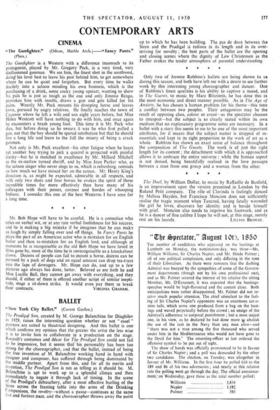CONTEMPORARY ARTS
CINEMA
The Gunfighter is a Western with a difference inasmuch as its protagonist, played by Mr. Gregory' Peck, is a very tired, very disillusioned gunman. We see him, the finest shot in the southwest, doing his level best to leave his past behind him, to get somewhere where he can be quiet and forgotten. But every time he walks docilely into a saloon minding his own business, which is the purchasing of a drink, some cocky young upstart, wanting to show his pals he is just as tough as the one and only Jimmie Ringo, provokes him with insults, draws a gun and gets killed for his pains. Wearily Mr. Peck mounts his drooping horse and leaves town, pursued by angry relatives. He finally reaches the town of Cayenne where he left a wife and son eight years before, but Miss Helen Westcott will have nothing to-do with him, and once again he encounters a brash young fool. This time it is Mr. Peck who dies, but before doing so he swears it was he who first pulled a gun, not that the boy should be spared retribution but that he should live a long life and learn to the full the misery of being a crack gunman.
Not only is Mr. Peck excellent—his utter fatigue when he hears yet another boy trying to pick a quarrel is projected with painful clarity—but he is matched in excellence by Mr. Millard Mitchell as the ex-outlaw turned sheriff, and by Miss Jean Parker who, as the saloon singer who never sings to us, which is refreshing, reminds us how much we have missed her on the screen. Mr. Henry King's direction is, as might be expected, admirable in all respects, and with only two shots and four horses he evokes the spirit of those incredible times far more effectively than have many of his colleagues with their posses, corpses and hordes of whooping Indians. I consider this one of the best Westerns I have seen for a long time.
* *
Mr. Bob Hope will have to be careful. He is a comedian who relies on verbal wit, or at any rate verbal foolishness for his success, and he is making a big mistake if he imagines that he can maks. us laugh by simply falling over and off things. In Fancy Pants he plays the part of an American actor who is mistaken for an English butler and then re-mistaken for an English lord, and although at moments he is recognisable as the old Bob Hope we have loved in films gone by, most of the time he is unrecognisable as a knockabout clown. Dozens of people can fail to,,,mount a horse, dozens can be pursued by a pack of dogs and an equal amount can drop tea-trays into the laps of dowagers. Mr. Hope can do, and up to a few pictures ago always has done, better. Beloved as are both he and Miss Lucille Ball, they cannot get away with everything, and they should, if either of them is offered another script of similar inepti- tude, stage a sit-down strike. It would even pay them to break


































 Previous page
Previous page